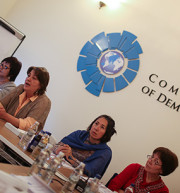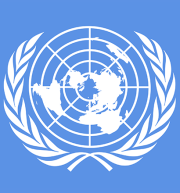
(WARSAW, Poland) – Political will is a major obstacle in ensuring civil society’s access to resources in many OSCE countries, according to participants in a May 7 regional dialogue organized in Warsaw by the Community of Democracies and the team of UN Special Rapporteur Maina Kiai. “It’s not a question of convincing through enough human rights laws or standards,” said one participant. Sometimes “they can’t be convinced.” The dialogue was the first event in a new two-year project focused on enhancing space for civil society and strengthening the right to access financial resources. The project was launched in February, and is being funded by the Swedish Ministry of Foreign Affairs. The May 7 Warsaw event looked at international human rights norms, standards and mechanisms to promote the right to freedom of association – and possible ways to strengthen these tools. More than 20 members of civil society from throughout the OSCE region participated. The focus on political will was central to the discussions, with one participant saying that talking about human rights norms to the government in his country was like “talking to the wall.” As a result, the road to ensuring civil society’s access to resources will require creative schemes and new ways of thinking, participants said –... Continue reading →

The ability to seek, receive and utilize resources is an inherent part of the right to freedom of association. This shouldn’t be a controversial statement. By definition, organizations need resources – financial, human and material – to operate. Without money, staff and equipment, an association is reduced to an empty shell – a vehicle stripped of its engine, fuel and driver. Unfortunately, civil society’s ability to access resources is far from secure in today’s world. Restrictions on funding have in recent years become a major threat to associations in a range of countries across all regions of the world, as UN Special Rapporteur Maina Kiai has repeatedly pointed out. There is clearly a trend toward strangling civil society with the financial noose, and the trend is growing. There is an urgent need to further strengthen associations’ ability to access resources, and to protect it. In this spirit, the Special Rapporteur recently partnered with the Community of Democracies to launch a project dedicated to enhancing space for civil society, with a particular focus on the ability to access financial resources. More on the project – which is funded by the Swedish Ministry of Foreign Affairs— is available here. The centerpiece of the project will be a series of five regional dialogues led... Continue reading →

On November 25-26, 2013, Maina Kiai participated in a conference of civil society leaders in Blantyre, Malawi, organized by ACT Alliance. The consultation focused on space for civil society, and was convened to explore ways that civil society groups in the region can ensure their ability to operate in a so-called “enabling environment.” Such an environment includes a functioning democratic judicial system, vibrant freedoms of expression, assembly and association, and the ability to secure funding and participate in public affairs. Three delegates at the conference produced a video summarizing the event, in which human rights defenders, activists, civil society leaders and representatives from non-governmental organizations discuss the challenges they face in countries across southern Africa and beyond. It features interviews covering a range of countries and contexts, and includes an interview with the United Nations Special Rapporteur on the rights to freedom of peaceful assembly and of association, Maina Kiai. This video was facilitated by InsightShare and funded by the Church of Sweden. For more on the conference, see our press... Continue reading →
Blantyre, Malawi – Maina Kiai told a conference of civil society leaders in Malawi today that African civil society is “under attack” from all angles and facing a crisis of shrinking space, as underscored by recent developments in Kenya and South Sudan. “Governments across the region are moving rapidly to squeeze civil society out of its rightful place in the public sphere,” Kiai said after the speech. “They see civil society as a competitor, challenging their authority. And they are attacking from all angles – cutting off their ability to seek funds, imposing improper registration requirements, and harassing people who speak out.” Kiai, the United Nations’ Special Rapporteur on the freedoms of peaceful assembly and of association, spoke of the attacks during a keynote address on the first day of the ACT Alliance regional consultation on civil society space in Blantyre. The consultation was convened to explore ways that civil society groups in the region can ensure their ability to operate in a so-called “enabling environment.” Such an environment includes a functioning democratic judicial system, vibrant freedoms of expression, assembly and association, and the ability to secure funding and participate in public affairs. Kiai pointed to numerous examples of shrinking civil... Continue reading →

United Nations Special Rapporteur Maina Kiai will address a high-level UN panel hosted by US President Barack Obama on Sept. 23, 2013. The panel, which will be held on the sidelines of the UN General Assembly in New York, is focused on supporting civil society in the face of shrinking space globally. Kiai is the UN special rapporteur on the rights to freedom of peaceful assembly and of association, a position he has held since May 2011. UN Secretary General Ban Ki-moon and several heads of state are expected to be in attendance. Presentations will also be made by Presidents Obama, Enrique Peña Nieto of Mexico and Tsakhiagiin Elbegdorj of Mongolia. “It is a great honor to be invited to address this distinguished group,” Kiai said. “It is also a great opportunity – a chance to directly address these leaders on the most pressing issues confronting civil society globally. “This is an ideal forum to urge the governments of the world to recognize and cement the role that civil society plays in political, civic, economic and social development. ” Kiai’s speech, titled “Sounding the Alarm: emerging threats to civil society and the need for a coordinated international response,” is expected to focus on emerging areas of concern, particularly governmental restrictions on funding for... Continue reading →

Restrictions on funding have become a major existential threat to associations across the world, as governments increasingly use the financial noose as a way to silence peaceful dissent. Under international law, freedom of association encompasses not only the right to form and join an associations but also to seek, receive and use resources – human, material and financial – from domestic, foreign, and international sources. Sadly, the number of barriers to seeking such resources are increasing. This April 2013 report from UN Special Rapporteur Maina Kiai documents many examples: In Ethiopia, for instance, a law introduced in 2009 prohibits human rights associations from receiving more than 10 per cent of their overall resources from foreign sources. In Russia, a July 2012 law requires foreign-funded organizations engaging in “political activities” as so-called "foreign agents." States are obliged to facilitate, not restrict, access to funding so that associations can effectively take part in democratic and developmental processes, just like businesses and governments. This report also addresses obstacles to peaceful assembly and provides an overview of the Special Rapporteur's activities between May 1, 2012, and February 28, 2013. The report's document number is A/HRC/23/39. Update May 2014: In... Continue reading →

United Nations Special Rapporteur on freedom of peaceful assembly and of association, Mr. Maina Kiai, today urged the Algerian authorities to seize the unique opportunity offered by the upcoming legislative elections to ensure that the new regulations for civil society organizations, adopted at the end of last year, adequately meet the requirements of international human rights law. “The legislative elections, scheduled on Thursday, 10 May 2012, must address civil society’s legitimate demands and uphold freedom of association,” Mr. Kiai stressed. “While the Arab Spring paved the way for a more inclusive participation of civil society, it is highly regrettable that Algeria has now taken a step backwards in relation to freedom of association by placing more rigorous limits on the scope of associations’ activities or their access to funding.” The human rights expert voiced particular concern about many provisions of Law 12-06 on associations adopted in December 2011, which imposes new controls and restrictions on the establishment of associations and their access to foreign funding. Under the new law, the formation of an association requires prior approval by the authorities, who can now reject a registration application without referring the matter to a judge, as was previously the case.... Continue reading →